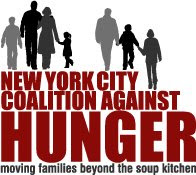A
new federal law that went in to effect this month could hurt New York City by as much as $375 million a year in fees. Neil DeMause reported in the
Village Voice of the meeting between councilmember Bill de Blasio and Human Resources Administration commissioner Verna Eggleston. Essleston noted that the federal government has redefined allowable work activities for welfare recipients to exlude, for example, caring for sick relatives. She still plans on increasing the city's participation rate for eligible individuals up to the required 50 percent. Whether the city will be able to reach that goal is not known. If the city does not reach that goal, then federal funding could be cut by as much as $375 million a year. Eggleston, however, did not state what this funding loss could mean to the city's poor. She simply reassured that she believes the poor should not "bear the brunt of our inefficiencies."
Joel Berg, Executive Director of the New York City Coalition Against Hunger, also attended, and stated that only 23 percent of welfare recipients in New York City have left welfare because they found work, and one-quarter of those were no longer employed six months later.
In his testimony regarding welfare reform, Berg said you cannot judge the success of welfare reform solely by how many people leave welfare for work. He likened this to judging the success of a hospital solely by how many people leave. Berg stated, "you never hear a public official say: 'Well, fewer people are getting social security, great!'"

No comments:
Post a Comment